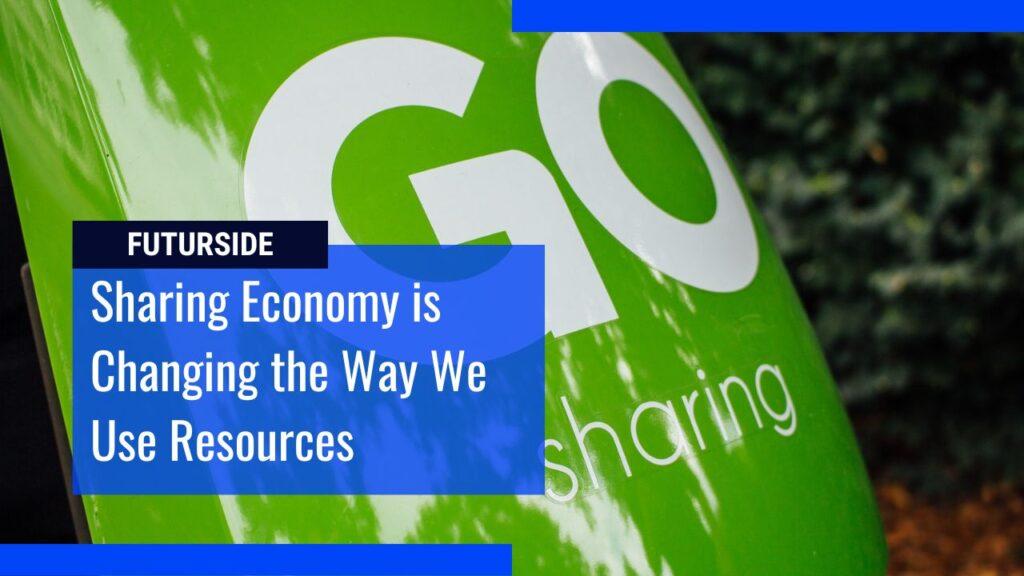The term “sharing economy” is an expression used to describe a global economic system where individuals share assets and services for free or for a fee. This type of sharing typically takes place through the Internet. The sharing economy is often most successful in markets where assets are expensive, underutilized or idle.
The underlying concept of the sharing economy is similar to that of peer-to-peer networks. It is a way to access unused human and physical resources. It allows people to share resources with others while at the same time reducing the cost of available goods and services. For example, it’s cheaper to rent a bandsaw than to purchase it, saving hundreds of dollars each time you need one.
By 2025 the sharing economy is set to reach $335 billion. Many local merchants are exploring the concept to make extra money. But how can it help the planet?
The sharing economy can reduce the number of resources we waste on an individual level. Take cars for example, by reducing the number of people who own cars and encouraging car sharing, a city can reduce its energy consumption and decrease carbon emissions. Using a shared car can also reduce the amount of fuel used for transportation.
Car-sharing services like Zipcar contributed to reducing congestion and emissions. Drivers sharing information about road and traffic congestion on Waze contribute to reducing congestion and fuel use.
Take for instant Uber, the founder had in mind San Francisco, a city where tourists and workers need convenient transportation options. However, the city has limited traffic capacity resulting in overgrazed roads as well as low wages for drivers, inexperienced drivers, congestion and air pollution.

The sharing economy is also helping the environment by lowering carbon dioxide emissions, which is one of the biggest global issues. By reducing the number of vehicles on the road, we can cut down our carbon emissions by 2 to 3 kilograms per person each year. And we can reduce pollution by carpooling with other people who want to use our cars. And by doing this, we can also save some money on the way.
In addition to financial savings, the sharing economy can help the planet by providing more opportunities for local communities. By allowing more people to share goods and services, we can help the planet by improving living standards. Many cities and towns have a shortage of housing and the sharing approach is the ideal solution to this problem.
By increasing access to shared resources, we can also reduce the amount of waste we generate. The benefits of the sharing economy are overwhelmingly positive. As with any new technology, it helps to promote sustainable practices. A shared economy can help the planet by providing more affordable services to consumers.
The sharing economy is also a way to improve resource efficiency and promote sustainable growth. It encourages people to share things they don’t need so that people who need them don’t have to buy one. In addition to this, the sharing platforms make it easier for individuals to share items with other people. A shared item can also be rented by multiple people.
The split economy will benefit the planet by reducing the amount of waste we produce. Food waste is a big problem around the world, it is estimated that about one-third of all food produced in the world goes to waste. Along with food banks, which have long received unsold inventories from retailers, digital platforms can help reduce waste and the carbon footprint associated with it.
The app OLIO enables neighbors and local businesses to share food, helping to avoid that waste. “Share More. Waste Less” is its motto. Similarly, the American startup Rent the Runway seeks to make fashion more sustainable by allowing people to rent garments instead of buying them. Not to mention that the fashion industry has a huge impact on the environment.

Hence every time you rent you’re saving all the water, electricity, and emissions used to manufacture a new piece of clothing. The average American throws away 81 pounds of clothing per year. Avoiding unnecessary waste in food and clothes might cut global carbon emissions by as much as 10 percent. Not to mention that after oil, the food and fashion industries contribute the most to climate change.
The sharing economy offers many benefits. With this approach, you can find items of any type and share them with people in need. The surplus income you make can be used for better customer service and to improve your living standards.
Airbnb claims that travelers staying with a host use much less energy per stay than if they rented a hotel room. A study from the company claims that in one year alone, their guests in North America saved the equivalent of 270 Olympic-sized pools of water while avoiding the greenhouse gas emissions equivalent to 33,000 cars.
In the European Union, the figures were even higher, water savings is estimated to be equivalent to 1,100 pools and emissions savings equivalent to 200,000 cars. The study also reported that Airbnb guests are 10 to 15% more likely than hotel guests to use public transportation, walk or use a bicycle.
Another notable wonder of markets driven by shared-resource is that they can tackle egoistic abuse of the common good by some individuals that leads to the depletion of the resource for everyone else. We are faced with a rise in population growth and earth limited resources.
The sharing economy is a win-win solution for the environment and human relationships. It helps improve resource efficiency, promotes sustainable growth and cuts excess consumption. With an estimated doubled global population by 2050, it is essential to increase the efficiency of resource management. By promoting collaborative consumption, the sharing concept can reduce the impact of individual consumer behaviors on the planet.
It may also help us relieve the pressure on natural resources, for instance by reducing the need to have a large stock of vehicles in operational condition. Thus, car sharing may be a better use of existing resources. And people seem to be willing to pay to share goods and services because it adds value to their lives.
“In a shareable world, things like car sharing, clothing swaps, food giving and cohousing make life more fun, green and affordable”. Scientific American suggested that “sharing is caring.” “When we share, not only is a better life possible but so is a better world.” One study found that the online platform Craigslist significantly decreases waste disposal after it starts to operate in a city.
In general, except possibly for ride-hailing, the sharing economy promises to help preserve the resources of the planet. In an international survey conducted by ING, people reported that they use sharing platforms because they believe they are good for the environment and they help build communities.
The sharing economy favors horizontal organizations and structures to reduce costs and eliminate intermediaries. It emphasizes social and ecological values and uses the shared economy to create a more equitable society. And also emphasizes using instead of owning. It is a growing phenomenon and will continue to grow in importance. The economic model behind the concept should be explored more closely.

0 Comments